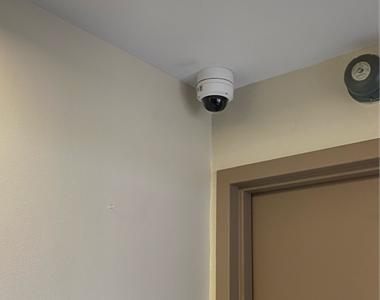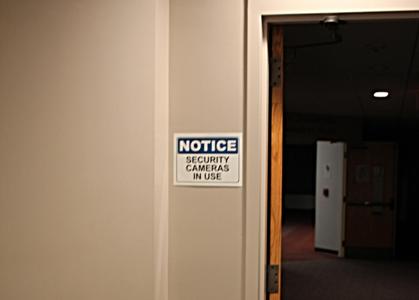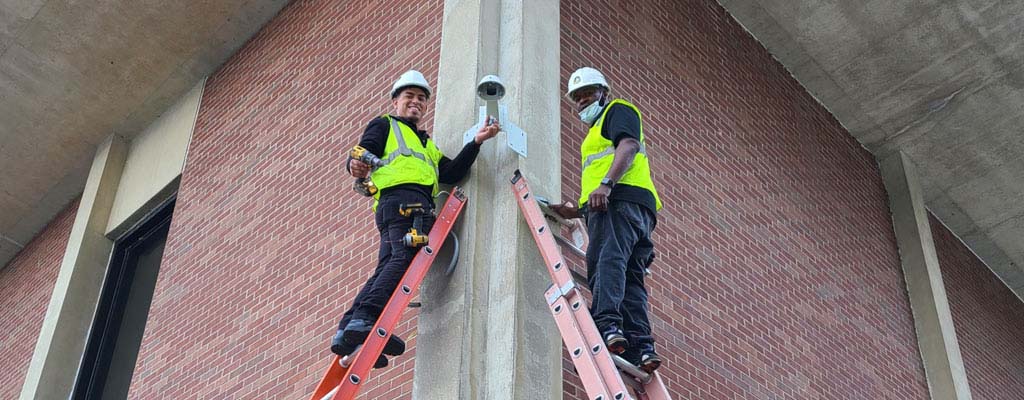When an employee spots a camera in the workplace, or even when a shopper spots a camera in a retail store, the first thing they want to know is if it can record sound. In short, the answer is yes, CCTV camera systems are designed to record audio in conjunction with images.
However, whether or not an employer or a retail location is allowed to record audio is another matter entirely.
Additionally, the type of cameras doing the recording—whether IP or analog — dictates how the audio is captured.
This post gives a brief overview of how audio is captured by CCTV security cameras, as well as a rundown of the basic privacy rights that employers and retail locations alike must abide by when using surveillance systems to monitor employees.

Many employers have security cameras installed to prevent theft and to ensure that employees are making good use of their paid-for time. This is perfectly acceptable so long as the employer informs employees that they are being recorded.
That said, there are some instances in which it is illegal for employers to record their workers. For instance, many union workers cannot be monitored by a camera system.
State laws vary on where and how employees can be recorded, but all agree that private settings, such as restrooms and break rooms, are off-limits as areas where employees have a reasonable expectation of privacy.
And federal law dictates that, in almost all situations, the recording of oral communication in the workplace is prohibited.

First and foremost, it’s important to know that employers may only monitor their employees if they have a legitimate reason to do so.
For instance, if supplies have been disappearing or if an off-limits area is routinely being unlawfully accessed, they have the right to install surveillance cameras to identify the perpetrator so that they can be properly reprimanded.
Retail locations such as banks, stores, restaurants, and other businesses that routinely interact with customers have two reasons to install surveillance cameras: to protect their employees and for theft prevention.
Most individuals who choose to work in retail are aware that their actions will be monitored, but even so, it is the employer’s duty to inform new hires of their surveillance policies.
Employers might explain to employees that the cameras are there for their protection but that if an employee is caught stealing or acting in poor conduct, the footage can and will be used against them.
In short, it is safe to say that an employee working in a cubicle or private office has a reasonable expectation of privacy, while an employee working in the customer service industry does not.
For this reason, if an employer does choose to monitor its employees' interaction with other employees, it must have a very good reason for doing so.
That being said, no matter the purpose of the employer’s surveillance, wiretapping is never okay.
If an employee does find out that their employer has illegally recorded their oral communication, the employer could be in trouble and may even lose the right to use the footage for prosecutions.
In the CCTV world, there are two types of cameras generally used: analog CCTV and IP CCTV. Which cameras a system utilizes dictates how sound is recorded and replayed.
On an IP camera system, the audio input is fed directly into the IP camera. However, the signal transmission is analog between the IP camera and the microphone, but it becomes digitized when it hits the IP camera level. From there, the camera sends a digital signal transmission to the NVR for instant playback.
The number of microphones that can be installed on an IP CCTV system depends on the number of video channels on the NVR and whether the cameras used come with audio input. If they do, and if the NVR has, say, 6 channels, the system can accommodate up to 6 microphones—one per camera and channel.
On an analog CCTV system, the audio isn’t digitized in the camera; rather, it goes directly to the DVR. The DVR receives an analog signal transmission, which it then digitizes itself.
Again, the number of microphones an analog system can accommodate depends on the number of outputs allowed by the DVR.
However, no matter which type of system is used—whether IP or analog—the same holds true: surveillance cameras can record sound.
However, because companies are at risk of violating privacy rules when they record audio, many choose not to implement this feature.

Whether you work, live, or play in Connecticut—or all three!—you can benefit from Mammoth Security’s CCTV camera systems. Our security installation people understand Connecticut privacy laws better than most and can help you implement a security system that doesn’t violate any state or federal laws.
Even if you are not able to record audio, our team can advise you on the best setup for your cameras so that you can identify and prevent any unlawful activity before it occurs.
At Mammoth Security, we use HD Digital cameras, which are capable of powerful zooming and higher resolution output than your standard analog cameras. This means that even without audio, you have the capabilities to zoom in on any suspicious activity, and if you do find hard evidence on a person or within a person’s possessions, the footage can be used as valid court evidence.
Another great feature of our systems is that they are able to be viewed remotely. This means that even if you go on a family vacation for a week, you can still monitor your workplace from afar via your Android or iOS device. If you have a laptop on hand, you can even pull up the footage on that. Anywhere you have an Internet connection, you have access to your video footage.
Finally, one concern that many of our clients have is that they already have a security camera system in place and don’t want to spend thousands of dollars completely replacing that system—they just want to update it.
With our technology and the expertise of the Mammoth Security crew, that is completely possible. We customize our offerings so that they can fit in with existing equipment.
If you own a business or manage property in Connecticut, you’ve probably seen our cameras before. Our mission is to protect the people of our community by bringing them the most advanced surveillance technology available.
If you’re interested in learning more about how you can protect your business, your home, or both, fill out the form below for a free site survey and installation quote. We offer professional security camera installation services throughout Connecticut at affordable prices.